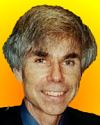 (source)
(source)
|
Douglas Hofstadter
(15 Feb 1945 - )
American cognitive scientist with interests in philosophy, psychology, history and philosophy of science. In his research he has studied the mechanisms underlying discovery and creation in mathematics.
|
Science Quotes by Douglas Hofstadter (8 quotes)
Consider the very roots of our ability to discern truth. Above all (or perhaps I should say “underneath all”), common sense is what we depend on—that crazily elusive, ubiquitous faculty we all have to some degree or other. … If we apply common sense to itself over and over again, we wind up building a skyscraper. The ground floor of the structure is the ordinary common sense we all have, and the rules for building news floors are implicit in the ground floor itself. However, working it all out is a gigantic task, and the result is a structure that transcends mere common sense.
— Douglas Hofstadter
In Metamagical Themas: Questing for the Essence of Mind and Pattern (1985), 93–94.
Enormous numbers of people are taken in, or at least beguiled and fascinated, by what seems to me to be unbelievable hocum, and relatively few are concerned with or thrilled by the astounding—yet true—facts of science, as put forth in the pages of, say, Scientific American.
— Douglas Hofstadter
Metamagical Themas (1985), 93.
Hofstadter’s Law: It always takes longer than you expect, even when you take into account Hofstadter’s Law.
— Douglas Hofstadter
Gödel, Escher, Bach: An Eternal Golden Braid (1979), 152.
I am the thought you are now thinking.
— Douglas Hofstadter
From 'On Self-Referential Sentences' Scientific American (Jan 1981), 244, 28. Collected in Metamagical Themas (1985), 11.
I would proclaim that the vast majority of what [say, Scientific American] is true—yet my ability to defend such a claim is weaker than I would like. And most likely the readers, authors, and editors of that magazine would be equally hard pressed to come up with cogent, non-technical arguments convincing a skeptic of this point, especially if pitted against a clever lawyer arguing the contrary. How come Truth is such a slippery beast?
— Douglas Hofstadter
Metamagical Themas (1985), 93.
It turns out that an eerie type of chaos can lurk just behind a façade of order—and yet, deep inside the chaos lurks an even eerier type of order.
— Douglas Hofstadter
Metamagical Themas: Questing for the Essence of Mind and Pattern (1985, 1996), 299.
Martin Gardner is one of the greatest intellects produced in this country in this century.
— Douglas Hofstadter
As quoted in Kendrick Frazier, 'A Mind at Play: An Interview with Martin Gardner', Skeptical Inquirer (Mar/Apr 1998), 22, No. 2, 36.
Perhaps the problem is the seeming need that people have of making black-and-white cutoffs when it comes to certain mysterious phenomena, such as life and consciousness. People seem to want there to be an absolute threshold between the living and the nonliving, and between the thinking and the “merely mechanical,” ... But the onward march of science seems to force us ever more clearly into accepting intermediate levels of such properties.
— Douglas Hofstadter
‘Shades of Gray Along the Consciousness Continuum’, Fluid Concepts & Creative Analogies: Computer Models of the Fundamental Mechanisms of Thought (1995), 310.
 In science it often happens that scientists say, 'You know that's a really good argument; my position is mistaken,' and then they would actually change their minds and you never hear that old view from them again. They really do it. It doesn't happen as often as it should, because scientists are human and change is sometimes painful. But it happens every day. I cannot recall the last time something like that happened in politics or religion.
(1987) --
In science it often happens that scientists say, 'You know that's a really good argument; my position is mistaken,' and then they would actually change their minds and you never hear that old view from them again. They really do it. It doesn't happen as often as it should, because scientists are human and change is sometimes painful. But it happens every day. I cannot recall the last time something like that happened in politics or religion.
(1987) -- 


